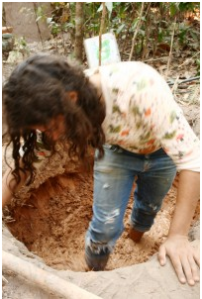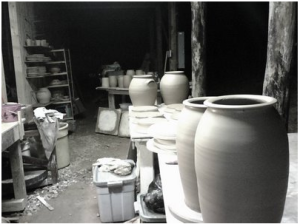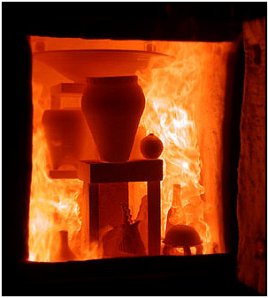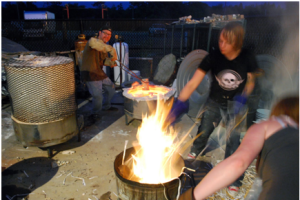I am the Clay
My Bible reading last night lead me to this verse Jeremiah 18:3-6. 3 So I went down to the potter’s house, and I saw him working at the wheel. 4 But the pot he was shaping from the clay was marred in his hands; so the potter formed it into another pot, shaping it as seemed best to him. 5 Then the word of the LORD came to me. 6 He said, “Can I not do with you, Israel, as this potter does?” declares the LORD. “Like clay in the hand of the potter, so are you in my hand, Israel.
One of my favorite hymns has always been the Potter’s hands. “You are the potter, I am the Clay, mold me and make me this is what I pray” As an artist those words held a powerful image of my relationship with God. Knowing what goes in to making pottery I would sing those lines with fear and awe knowing that what I prayed upon myself was not an easy life but it would be beautiful.
This verse brought that home to me. I know many vaguely understand this metaphor as a peaceful scene of sitting by the wheel forming a pot, glazing it and firing it to be beautiful and useful. There is SO MUCH MORE to it. So I felt I should share this in more detail so that others can fully understand what it means to be the clay.
Step 1: Preparing the clay. In school it came to us in bricks that we threw into a large mechanical mixer with silt (runny gooy clay left over from other projects), and grog ( bits and dust of broken pottery). Then it is all mashed together in the right consistency to work with. I love this image because doesn’t it sometimes describe a mother and father so well. In Bible times it appears that the mixer was the potter’s own feet.
Isaiah 41:25
“I have stirred up one from the north, and he comes— one from the rising sun who calls on my name. He treads on rulers as if they were mortar, as if he were a potter treading the clay.
“I have stirred up one from the north, and he comes— one from the rising sun who calls on my name. He treads on rulers as if they were mortar, as if he were a potter treading the clay.
Step2: Kneading. The potter kneads, pounds, and cuts the clay to make it smooth and the get the air bubbles out. We can’t rush this step because bubbles are deadly to the pot. They can show up on the wheel and ruin the whole pot causing it to be off balance and collapse. Or if it makes it past the wheel the air bubble will cause the pot to explode when it is fired and the air inside the bubble expands. This is the worst thing that can happen because not only is the pot destroyed but the explosion often breaks the pots that are near it in the kiln. Haven’t we all seen that happen in life, when our own weaknesses take out the people closest to us.
http://people.goshen.edu/~marvinpb/throw/53.html This site shows everything that goes into this step.
Step 3: The Wheel. When we get to the wheel, the potter must slam the lump of clay down exactly in the middle of the wheel. First because it must stick to the wheel and second because if it is not centered it will wobble making it nearly impossible the be round and giving the potter a great deal of trouble as the heavy side beats against the even pressure of the potter’s hands. This is so like the cycles we go through in life when we barely feel His hand nudging us to do His will and then our heavy side comes around, feeling that pressure pushing us to center and we fight it tooth and nail. The potter usually has to scrape these off the wheel, knead it again, and re-center the lump. A centered pot reflects the intentions of the potter’s hands the easiest.
Jeremiah 18:3-6 3 So I went down to the potter’s house, and I saw him working at the wheel. 4 But the pot he was shaping from the clay was marred in his hands; so the potter formed it into another pot, shaping it as seemed best to him.
Step 4: Bisque. In the process of drying you put your pot on the shelf and you walk away. WOW! Talk about the dark night of the soul. Sometimes God doesn’t seem very close. However, that doesn’t mean He is not thinking about us. When the potter is letting the pots dry, he is in the glaze room prepare the glaze, the very thing that most often catches the eye first in the pots people want. He is also preparing other pots to help fill the kiln with you. Drying can take a very long time. The expansion of water in the clay is another thing that can make it crack in the kiln. There is a short cut that most potters today use. You, I mean the pot ;) can go into the kiln first on a low heat. When I say low, I mean 1650° F. Ha. Not real comfortable, huh. The price of inpatience.
Step 5: The Glaze. This is where the pot is dipped in to a vat of dull thick liquid mixed with powdered metals, some precious metal, others rather ordinary. Sometimes the potter will paint the surface with hot wax so that the glaze does cover certain parts. These unglazed spot are often burnished first to make them shiny. This means rubbing something much harder against the pot to make the surface ultra-smooth. Or he will paint designs on the pot with a complimentary color. This is actually much hard than it sounds, especially if you are using natural glazes instead of commercial ones. The colors never look like they will after firing. They have to be the right consistency so they don’t run in the fire. And they have to mix well with the color below it which you never really know until you have done it before.
Lamentations 4:2
How the precious children of Zion, once worth their weight in gold, are now considered as pots of clay, the work of a potter’s hands!
How the precious children of Zion, once worth their weight in gold, are now considered as pots of clay, the work of a potter’s hands!
Step 6: THE FIRE: Of course this is the step we think of most. The thing we don’t always think of is that while we are in the hottest part of God’s refining fire, we are also in there with others. Some of the players in the kiln are the pot we spoke of earlier who was too impatient to have all the air pounded out of them. There are also the high fired ceramics molds that help to hold us upright and in place while we are being fired. They don’t have a pretty glaze on them but they have withstood hotter fires than us just so they could support us. There are also pots with different glazes that might bleed their own glaze onto us if we are close to them. This is all things the potter must concider when loading the kiln. The kiln has to be packed just right so the fire can evenly bake each pot. The tighter it is packed the more efficient it heats but the more likely the pots will affect those around them. I wonder if this is how the church works.
Romans 9:21
Does not the potter have the right to make out of the same lump of clay some pottery for special purposes and some for common use?
Does not the potter have the right to make out of the same lump of clay some pottery for special purposes and some for common use?
Step 7: Cooling. My favorite kind of pottery is Raku. It is a more modern style but so appropriate to our modern world. It is a lower heat and a faster process. Oh, that sounds so appealing to our metaphor here. However, there is an interesting extra step involved. Raku pots are taken out of the fire at their hottest with metal tongs and placed into a trash can of saw dust or old news papers. This leads to billows of black smoke, sparks, and some interesting noises. The pot puts up quite a fight. The stress of this rapid cooling often causes the pot to break. I even had a bowl melt into a lovely candle plate my mother still uses. The pots less likely to break are the more porous ones. They have a coarser grog mixed into them. This is wonderful to know that we don’t have to be made of the fine expensive porcelain clay to make beautiful pots. Yet knowing we are not the finest clay makes us question our value, so that when we are thrown into the trash can we think God has given up on us or that He forgot about us. But it is all part of the plan. This extra step puts a luster on the pot that other firing techniques can't compare to.
Isaiah 29:16a Shall what is formed say to the one who formed it, “You did not make me”? Can the pot say to the potter, “You know nothing”?
After the appropriate amount of time in the trash can (which varies based on glazes) the pot is cooled further in a vat of water. Oh how I long for that cooling water sometimes but I know that there are steps that must be followed and cannot be skipped
All of this results in this….
Beautiful, shiny, useful, and each one unique. A Masterpiece!
Email me to discuss commissioned works of art for the home or business at













